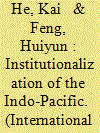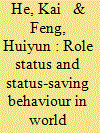| Srl | Item |
| 1 |
ID:
176244


|
|
|
|
|
| Summary/Abstract |
Although the term ‘Indo-Pacific’ has become popular in the foreign policy discourse of some countries, we have yet to see any significant institution-building in the Indo-Pacific region. Borrowing insights from functional institutionalism and political leadership studies of international regimes, we introduce a ‘leadership–institution’ model to explore the problems and prospects of institutionalizing the Indo-Pacific. Through a comparative case study of the institutionalization of the Asia–Pacific vs the Indo-Pacific, we argue that two crucial factors contributed to the slow institutionalization of the Indo-Pacific as a regional system in world politics: the lack of ideational leadership from an epistemic community and the weak executive leadership from a powerful state. While ideational leaders can help states identify and expand common interests in cooperation, executive leadership will facilitate states to overcome operational obstacles in cooperation, such as the ‘collective action’ problem and the ‘relative gains’ concern. The future of institution-building in the Indo-Pacific will depend on whether and how these two leadership roles are played by scholars and states in the region. In the conclusion, we discuss the challenges of institutionalizing the Indo-Pacific and highlight China as a wild card in the future of Indo-Pacific regionalism.
|
|
|
|
|
|
|
|
|
|
|
|
|
|
|
|
| 2 |
ID:
184951


|
|
|
|
|
| Summary/Abstract |
Most research on status in international politics focuses on a state's ‘trait status’, defined by valued attributes that a state possesses, but ignores the importance of ‘role status’, which is constituted through state interactions and competent practices in world politics. By integrating prospect theory and role status scholarship, this article introduces a ‘status-saving’ argument to shed light on how states adopt risk-acceptant strategies to salvage the decline in their role status in world politics. We test the status-saving argument by examining the ASEAN states’ bold community-building efforts in the early 2000s, especially the adoption of the ASEAN Charter in 2007. We argue that both the economic and political conditions of ASEAN were far from mature enough to pursue such an institutionalization and legalization endeavour. The perceived decline of international role status after the 1998 Asian financial crisis, however, encouraged the ASEAN states to take this ‘great leap forward’ behaviour towards regional integration, which has placed ASEAN's long-term status and internal unity in a more risky and vulnerable position. We conclude that pursuing role status is another way for states, especially rising powers, to seek status in a deference hierarchy. Dominant powers should consider accommodating the pursuit of role status by rising powers and encourage ‘do-goodism’ in world politics.
|
|
|
|
|
|
|
|
|
|
|
|
|
|
|
|